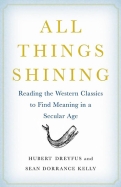By Daniel Hendrickson
About our sad, lost lives, and our determined and desperate endeavors — ineffectively — to discover of them meaning and purpose, All Things Shining offers an exceptional and enthralling discussion. Both Hubert Dreyfus and Sean Dorrance Kelly are concerned about our secular age — philosophically, social — analytically, exegetically, they are pointed, poignant, and playful.
Knowing Charles Taylor’s award-winning, career-defining work, A Secular Age, is not necessary for enjoying All Things Shining, but its influence upon Dreyfus and Kelly — page after page, in places — is palpable.
Like Taylor, Dreyfus and Kelly lament a pervasive malaise and lack of purpose in the lives of contemporary Westerners. A “nihilism of the secular age leaves us with the awful sense that nothing matters in the world at all.” This, they claim, is a particular American mood, and it is characterized by addiction, depression, consumerism, terrorism, and tennis academies. They use the acclaimed novelist David Foster Wallace to make their point, and are trying to get us to realize that we cannot, in our own individual resources, manufacture genuine meaning and purpose. To establish their case, they turn from Wallace’s Infinite Jest all the way back to Shakespeare — pondering the inexplicable tenability of Hamlet’s perfectly modern query, “To be or not to be . . .” — and then return to Elizabeth Gilbert’s Eat, Pray, Love to proffer a convincing interpretation of our modern lives through literature. To these, Dante demonstrates a medieval counterpoint, but only to show how a cosmos pregnant in purpose is wholly dismantled by the waves of a wide-open ocean and the wild whale-chase of Moby Dick.
And like Taylor again, they indict Descartes. It is Descartes who “established our Modern World in which we understand ourselves as self-sufficient subjects . . .”It is Descartes who insisted that such subjects “at their best are completely detached, self-contained, and, far from being passive, have a willpower so great that it rivals God’s. A mechanical world scientifically understood is not so enticing after all. Worse, yet, is an inflated individuality which, somehow, by its lonesome, makes existential sense of it. Dreyfus and Kelly maintain that Descartes’ personal autonomy is the real culprit behind modern meaninglessness.
Beginning with him and following a particular philosophical thread through the Enlightenment, Dreyfus and Kelly reach Nietzsche to show us how and why we are, today, nihilistic.
Though inspired by Taylor, Dreyfus and Kelly are quite sure that he does not have the right answers for negotiating a secular age. But they ask an interesting question, and one which Taylor would entertain: “What if we haven’t lost the sacred, shining gods, but have simply lost touch with the meanings they offer?” Representing the shortfalls of Modernity, they explain that “our focus on ourselves as isolated, autonomous agents has had the effect of banishing the gods — that is to say, covering up or blocking our sensitivity to what is sacred in the world.” Evocatively, they continue: “The gods are calling us but we have ceased to listen.”
I invite you to discover who the gods are, where they dwell, and what they say.
Allow me to conclude with an excerpt from A Secular Age. It is he, after all, who discusses these graced moments in widespread secular unity, and he wonders what they mean.
At the rock concert, at [Princess Di’s] funeral, what is shared is something else. Not so much an action, as an emotion, a powerful common feeling. What is happening is that we are all being touched together, moved as one, sensing ourselves as fused in our contact with something greater, deeply moving, or admirable; whose power to move us has been immensely magnified by the fusion.
This post may contain affiliate links.









